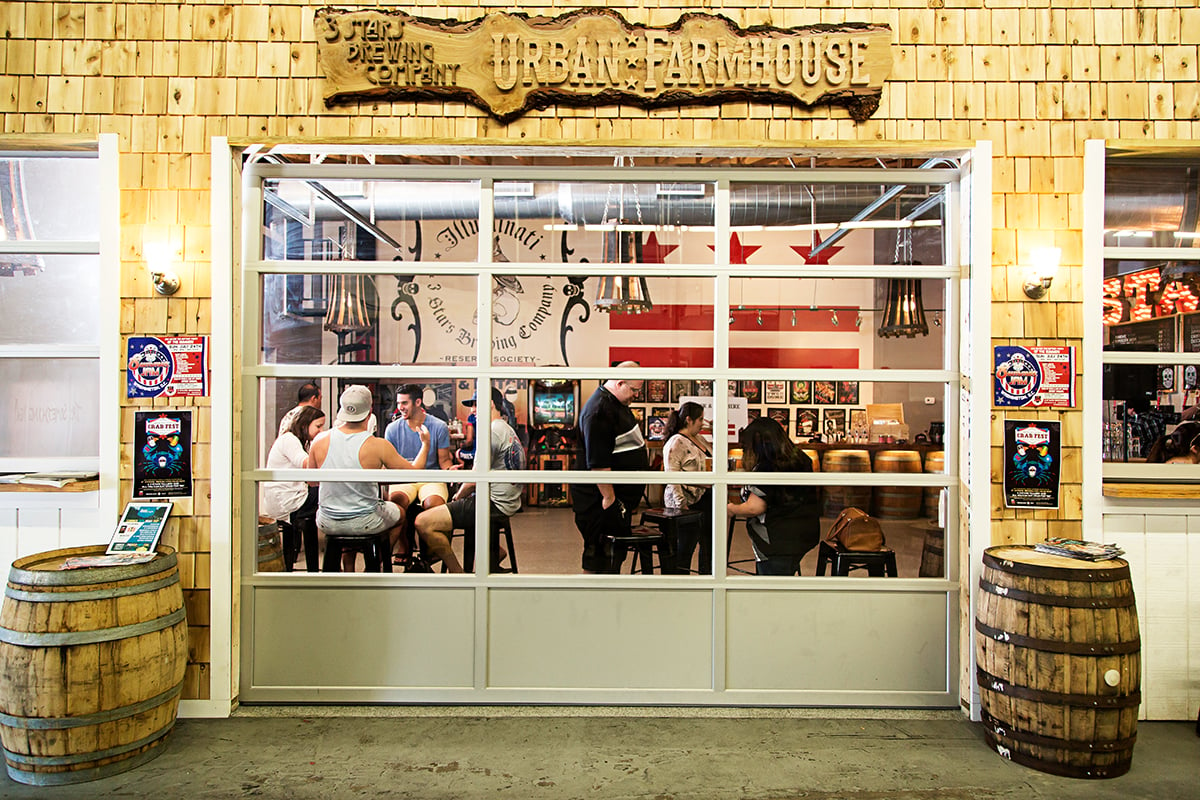ON AUGUST 25, KEN LUDWIG'S play Twentieth Century opens at Signature Theatre. Eleven days later, his Shakespeare in Hollywood, commissioned by the Royal Shakespeare Company, premieres at Arena Stage. It only took a Tony Award, a Laurence Olivier Award, and a few smash hits on Broadway for playwright Ludwig to become an overnight success in his hometown.
Ludwig came to Washington in 1976 after Harvard Law School. He took a job at Steptoe & Johnson, but he never really wanted to practice law–it was a concession to his parents, who thought a career in theater meant starvation.
Determined to write, Ludwig got up at 4 am to work on scripts, then went off to work at Steptoe. Ten years later, his first comedy, Lend Me a Tenor, was produced in London. Ludwig was able to leave the law and write full-time, though he is still of counsel at Steptoe & Johnson.
With his early successes, Ludwig was the toast of New York and London's West End. "But for 25 years, I couldn't get arrested here in Washington," he says. "They said I was too commercial."
Not anymore. Last season, Ludwig created a musical based on the Broadway show The Adventures of Tom Sawyer for the Kennedy Center's children's program. This year Ludwig has scored the equivalent of a one-two punch.
Twentieth Century is a new adaptation of the 1930s farce by Ben Hecht and Charles MacArthur. (MacArthur was married to Washington's Helen Hayes; an award in his name is given each year to the best new play of the Washington season.) A Broadway production of Ludwig's Twentieth Century, starring Alec Baldwin, opens March 18.
Shakespeare in Hollywood is a comedy based on the making of Max Reinhardt's movie of Shakespeare's A Midsummer Night's Dream in 1935. Ludwig saw comic possibilities in the combination of a European director's vision of Shakespeare, a daffy Hollywood censor's insistence on cleaning up the bard's bawdiness, and a studio looking for big bucks at the box office.
Simon Reade was the literary manager of the Royal Shakespeare Company when it commissioned Ludwig's play. Noting that it takes place against the backdrop of growing fascism in Germany, Reade says, "I saw a serious play in the making. Ken had the genius to see that its seriousness could be conveyed through an accumulation of farcical mayhem."
WHY DID IT TAKE WASHINGTON SO long to recognize Ken Ludwig? It may be the vestiges of Washington's inferiority complex about theater–if the guy is really good, why is he not in New York? Or it may be human nature. They say no man is a hero to his own valet, and no local playwright is a genius to the theater down the block.
Just ask Ernie Joselovitz, the godfather of the Washington playwriting community. He runs the Playwrights' Forum, which offers classes, readings, advice on working with theaters and scripts, and other resources for writers. The Forum has 75 members–from theater neophytes to produced playwrights who use the group as a sounding board for works in progress.
Joselovitz started writing plays at UCLA in the 1960s and came to Washington to be part of the New Playwrights' Theater in the '70s and '80s. In its heyday, New Playwrights' produced works like playwright Larry L. King's The Night Hank Williams Died, which went on to New York success.
Since the demise of New Playwrights', Joselovitz hasn't had a theatrical home. But that hasn't kept him from writing plays and getting them produced. He also has won lots of awards and received grants from the National Endowment for the Arts and the Kennedy Center Fund for New American Plays. His Shakespeare, Moses, and Joe Papp, produced last spring at Round House Theatre, won the 2003 Charles MacArthur Award for Outstanding New Play.
But Joselovitz, like Ludwig and many other playwrights, has found it it hard to get a local theater to support a play from birth to production. They aren't alone–revivals outnumber new plays on Broadway. One local playwright, Ari Roth, has solved this problem: He is also artistic director at Theater J, which has produced a number of his plays.
It's important for a playwright to have a theatrical partner because, unlike other forms of writing, a play doesn't come alive on the printed page. Even the playwright who "hears" the characters' voices during the writing process needs to see it performed to know if it works.
IDEALLY, A PLAY FIRST GETS A READING–a director casts actors who rehearse once or twice and then, sitting on chairs on a bare stage, read the play for an audience. Afterward, the playwright joins the actors onstage for a discussion of the work.
A play often goes through several drafts and readings before it is ready for the next step–a workshop production. In a workshop, actors have rehearsed for a few weeks and learned their lines, but the show is "up" for just a few nights with rudimentary costumes and set. It may take several readings, workshops, and rewrites before a play is ready for prime time.
More Washington-area theaters are doing readings of new plays, but few do workshops, and most still shy away from full productions of untested works, says Joselovitz.
That is changing, according to Marcia Gardner, literary manager of Arlington's Signature Theatre and one of the organizers of the New Play Network's From Page to Stage Festival at the Kennedy Center on August 31 and September 1.
The festival features readings of more than a dozen new plays, open rehearsals, discussions of plays and musicals, and a "new-play slam" that previews works in progress. All events are free.
Keith Bridges, artistic director of DC's Charter Theatre, was a force behind the festival along with Gardner and Gregg Henry of the Kennedy Center. Charter Theatre is a relatively new company doing only new works. "We founded the company to work on plays with playwrights, to be part of the process," Bridges says.
This will be Charter's fourth full season. The company has been using the National Conservatory of Dramatic Arts in Georgetown but in November moves to Flashpoint at 916 G Street in downtown DC.
Flashpoint is a new "creative laboratory" built by the Cultural Development Corporation, the group that put on the exhibition Art-o-Matic to showcase Washington's emerging artists in unused DC buildings.
CHARTER THEATRE'S FIRST PRODUCTION in its new space will be Allyson Currin's The Subject in November. Billed as a "darkly comic journey of obsession and compulsion," the play concerns a woman who agrees to model for a photographer who inspires both fascination and fear.
"It's about power and sex–even when there is none," Currin says.
Working with Charter Theatre is a "very happy marriage," Currin says. "They take a play and stay with it."
Currin is a theatrical triple threat–a playwright, an actor, and an acting teacher in George Washington University's Theatre and Dance department and the university's honors program. She's also taught playwriting in GW's English department.
Currin says being an actor helps her playwriting: "I can feel what actors can and can't do." She writes late at night when her family is asleep–balancing teaching, acting, and being the mother of six-year-old twin girls. Once a year she goes off alone to a family cabin in North Carolina to write.
Her plays often start as dialogues rather than plots. Her Amstel in Tel Aviv–a 1996 nominee for the MacArthur Award for Outstanding New Play–grew from conversations in a traditional girls' school.
Like most writers, her first works were autobiographical. But she swears she's not the subject of The Subject.
Like Currin, Martha King De Silva has been on both sides of the footlights. She started as a performer with a small improvisation group begun by Janet Stanford. Her first plays were based on those improvisations. De Silva's script for a one-woman show called Stretch Marks was nominated for the MacArthur Award in 2002. Her plays have been produced at theaters and drama festivals.
De Silva is now working with Charter Theatre on A Whole Life, in which a daughter returns home to visit her ailing father and confronts changes in the rest of her family. Last spring Charter did a reading; she's hoping for a workshop production this season.
De Silva writes on weekends. During the week she works in human resources for PricewaterhouseCoopers. She'd really like to write full-time. "It isn't the money, it isn't making a living at it that matters," De Silva says. "It feels like the only thing I should be doing."
DE SILVA'S DREAM HAS BECOME NORman Allen's reality. In the past decade, Signature Theatre has developed close relationships with a small group of local playwrights, among them John Strand, Heather McDonald, and Paulette Laufer. Norman Allen is another one of the lucky few.
"We used to look at any full-length script that hadn't been produced before, but we rarely got the opportunity to use any of them," Gardner says. Now Signature commissions work from playwrights who artistic director Eric Schaeffer and Gardner have found are in tune with the theater's vision. The writers get a home for developing their plays, full production of their scripts–and more. "We feel committed to getting them a second production, too," Gardner says.
Signature has produced several of Allen's plays, including Melville Slept Here and Nijinsky's Last Dance, which won four Helen Hayes Awards in 1999. Nijinsky is back–Signature's production is on stage in the Kennedy Center Terrace Theater August 27 through September 14.
The play tells the story of the gifted dancer's ill-fated life–his rise to balletic glory and his descent into madness. Allen has no background in ballet, but "I've always been fascinated with Russia," he says. "I read War and Peace every two years."
The play is not entirely biographical. Allen uses Nijinsky to express his own vision. He quotes a line that he feels is the heart of the play: "Any artist who claims atheism is a liar."
"Nijinsky never said that," Allen admits. "The actor may not even believe it. Those are the words of the playwright. It is meant to provoke the audience."
LIKE MOST PLAYWRIGHTS, ALLEN BEgan early–he wrote his first play in fifth grade. Like many, he stayed close to the theater even when he wasn't earning a living from his scripts.
When he first came to Washington in 1992, Betti Brown, then executive director of the Helen Hayes Awards, helped Allen get a job doing public relations for the Shakespeare Theatre. Brown also sent one of Allen's scripts to Eric Schaeffer. Allen soon moved to Signature as playwright in residence. He created the award-winning Signature in the Schools program, which brings Arlington high-school students to the theater to produce an original play.
Meanwhile, he keeps writing. He's working on his first big musical script, tentatively titled Miss Jones and I, based on music by Rodgers and Hart. Miss Jones had a reading in New York.
Playwriting comes easily to the ebullient Allen. "When it's going well, I'm literally taking dictation" from the characters, he says. But he wouldn't mind a few audience cries of "Author! Author!" on opening nights. That happens only in the movies.
"A play may run for eight weeks," he notes. "Before that there are four weeks of rehearsal. But it is the product of two or three years of a playwright's work and a lifetime of experience."
Washingtonians will have more chances to see readings of new plays this season at Arena Stage, Charter Theatre, Round House Theatre, and Theatre of the First Amendment. Plays by Ken Ludwig, Allyson Currin, and Norman Allen are coming soon to a theater near you.
Reviews of current productions and the latest on upcoming shows can be found at www.washingtonian.com.

















